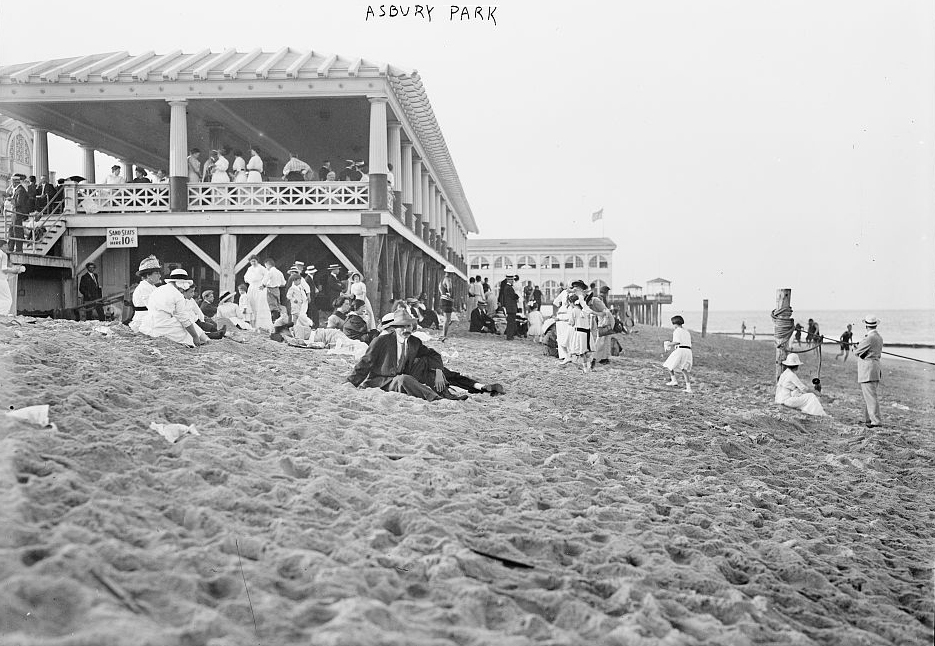|
Mrs. Jay's
Mrs. Jay's was a popular bar and restaurant located in Asbury Park, New Jersey. It was founded by John and Ida Jacobs and was located on Ocean and Second Ave., the current location of The Stone Pony. John and Ida started by selling hot dogs to tourists in 1922 at the Second Avenue location, but with the help of their daughter Jeanette and son-in-law Murray Wiener, eventually purchased the seasonal snack bar along with the property and established a family restaurant naming it Mrs. Jay's. John and Ida also opened Mrs. Jay's Beer Garden located on Ocean Avenue to the left of the restaurant serving 2% beer until the end of prohibition in 1933. Starting in 1965, Mrs. Jay's Beer Garden briefly offered Go-Go dancing Go-go dancers are dancers who are employed to entertain crowds at nightclubs or other venues where music is played. Go-go dancing originated in the early 1960s at the French bar Whisky a Gogo located in Juan-les-Pins. The bar's name was taken ... as entertainment, bu ... [...More Info...] [...Related Items...] OR: [Wikipedia] [Google] [Baidu] |
Asbury Park, New Jersey
Asbury Park () is a beachfront city located on the Jersey Shore in Monmouth County in the U.S. state of New Jersey. It is part of the New York metropolitan area. As of the 2020 U.S. census, the city's population was 15,188QuickFacts Asbury Park city, New Jersey . Accessed June 13, 2022. a decrease from 16,116 in 2010, [...More Info...] [...Related Items...] OR: [Wikipedia] [Google] [Baidu] |
The Stone Pony
The Stone Pony is a New Jersey music venue in Asbury Park, New Jersey known for launching the careers of many New Jersey music legends, including Bruce Springsteen, Jon Bon Jovi, and Southside Johnny and the Asbury Jukes. DeMasters, Karen (December 16, 2001). City Revival May Imperil Stone Pony. ''New York Times''. Retrieved December 19, 2010. The club opened in 1973. History  Prior to becoming a music venue, the building housed a restaurant named
Prior to becoming a music venue, the building housed a restaurant named [...More Info...] [...Related Items...] OR: [Wikipedia] [Google] [Baidu] |
Beer Garden
A beer garden (German: ''Biergarten'') is an outdoor area in which beer and food are served, typically at shared tables shaded by trees. Beer gardens originated in Bavaria, of which Munich is the capital city, in the 19th century, and remain common in Southern Germany. They are usually attached to a brewery, beer hall, pub, or restaurant. History Facilities of this kind existed for example in Bamberg since 1605 under the German term "Bierkeller" ("Beer cellars"). At that time, the Archdiocese of Bamberg was directly subordinated to Rome and not yet to the Duchy of Bavaria. Hence, the first "Biergarten" in the strict sense of the term and of the decree of 1812 by the Kingdom of Bavaria developed at the beginning of 19th century in Munich. While it is unknown which brewery was first, it was likely one of Munich's big six: Löwenbräu, Hofbräuhaus, Augustinerbräu, Paulaner, Hacker-Pschorr and Spaten. Seasonal limitations on when beer could be brewed were already in the ... [...More Info...] [...Related Items...] OR: [Wikipedia] [Google] [Baidu] |
Prohibition
Prohibition is the act or practice of forbidding something by law; more particularly the term refers to the banning of the manufacture, storage (whether in barrels or in bottles), transportation, sale, possession, and consumption of alcoholic beverages. The word is also used to refer to a period of time during which such bans are enforced. History Some kind of limitation on the trade in alcohol can be seen in the Code of Hammurabi (c. 1772 BCE) specifically banning the selling of beer for money. It could only be bartered for barley: "If a beer seller do not receive barley as the price for beer, but if she receive money or make the beer a measure smaller than the barley measure received, they shall throw her into the water." In the early twentieth century, much of the impetus for the prohibition movement in the Nordic countries and North America came from moralistic convictions of pietistic Protestants. Prohibition movements in the West coincided with the advent of women's su ... [...More Info...] [...Related Items...] OR: [Wikipedia] [Google] [Baidu] |
Go-Go Dancing
Go-go dancers are dancers who are employed to entertain crowds at nightclubs or other venues where music is played. Go-go dancing originated in the early 1960s at the French bar Whisky a Gogo located in Juan-les-Pins. The bar's name was taken from the French title of the Scottish comedy film '' Whisky Galore!'', which was titled ''Tight Little Island'' in the United States. The French bar then licensed its name to the very popular West Hollywood rock club Whisky a Go Go, which opened in January 1964 and chose the name to reflect the already popular craze of go-go dancing. Many 1960s-era clubgoers wore miniskirts and knee-high, high-heeled boots, which eventually came to be called go-go boots. Nightclub promoters in the mid‑1960s then conceived the idea of hiring women dressed in these outfits to entertain patrons. Etymology The term ''go-go'' derives from the phrase "go-go-go" for a high-energy person, and was influenced by the French expression '' à gogo'', meaning "in a ... [...More Info...] [...Related Items...] OR: [Wikipedia] [Google] [Baidu] |
Restaurants In New Jersey
A restaurant is a business that prepares and serves food and drinks to customers. Meals are generally served and eaten on the premises, but many restaurants also offer take-out and food delivery services. Restaurants vary greatly in appearance and offerings, including a wide variety of cuisines and service models ranging from inexpensive fast-food restaurants and cafeterias to mid-priced family restaurants, to high-priced luxury establishments. Etymology The word derives from early 19th century from French word 'provide food for', literally 'restore to a former state' and, being the present participle of the verb, The term ''restaurant'' may have been used in 1507 as a "restorative beverage", and in correspondence in 1521 to mean 'that which restores the strength, a fortifying food or remedy'. History A public eating establishment similar to a restaurant is mentioned in a 512 BC record from Ancient Egypt. It served only one dish, a plate of cereal, wild fowl, a ... [...More Info...] [...Related Items...] OR: [Wikipedia] [Google] [Baidu] |
Restaurants Established In 1922
A restaurant is a business that prepares and serves food and drinks to customers. Meals are generally served and eaten on the premises, but many restaurants also offer take-out and food delivery services. Restaurants vary greatly in appearance and offerings, including a wide variety of cuisines and service models ranging from inexpensive fast-food restaurants and cafeterias to mid-priced family restaurants, to high-priced luxury establishments. Etymology The word derives from early 19th century from French word 'provide food for', literally 'restore to a former state' and, being the present participle of the verb, The term ''restaurant'' may have been used in 1507 as a "restorative beverage", and in correspondence in 1521 to mean 'that which restores the strength, a fortifying food or remedy'. History A public eating establishment similar to a restaurant is mentioned in a 512 BC record from Ancient Egypt. It served only one dish, a plate of cereal, wild fowl, an ... [...More Info...] [...Related Items...] OR: [Wikipedia] [Google] [Baidu] |
Beer Gardens In The United States
Beer is one of the oldest and the most widely consumed type of alcoholic drink in the world, and the third most popular drink overall after water and tea. It is produced by the brewing and fermentation of starches, mainly derived from cereal grains—most commonly from malted barley, though wheat, maize (corn), rice, and oats are also used. During the brewing process, fermentation of the starch sugars in the wort produces ethanol and carbonation in the resulting beer.Barth, Roger. ''The Chemistry of Beer: The Science in the Suds'', Wiley 2013: . Most modern beer is brewed with hops, which add bitterness and other flavours and act as a natural preservative and stabilizing agent. Other flavouring agents such as gruit, herbs, or fruits may be included or used instead of hops. In commercial brewing, the natural carbonation effect is often removed during processing and replaced with forced carbonation. Some of humanity's earliest known writings refer to the production and d ... [...More Info...] [...Related Items...] OR: [Wikipedia] [Google] [Baidu] |

.jpg)





